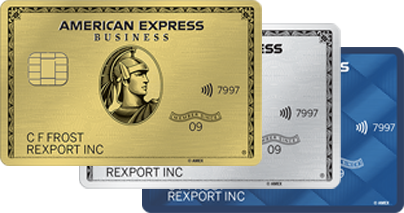
How to Apply for Credit Cards for Employees
By Randi Gollin | American Express® Freelance Contributor
5 Min Read | August 23, 2022
Summary
Depending on the needs and size of your company, it often makes sense to get business credit cards for employees. Employee credit cards give authorized card users permission to purchase company-related goods and services online or offline, from office supplies to airfare, within a set budget.
Business credit cards for employees have an upside for companies, too, allowing management to keep tabs on work-related expenses, implement clear-cut spending limits, and accumulate rewards. Employee credit cards also eliminate the need to reimburse staff members who use their personal cards for business expenses, among other benefits.
Here’s how to apply for credit cards for employees and the scoop on the relevant information required, plus tips and tricks for onboarding workers to ensure that they stick to business guidelines for using the card.

How to Apply for Business Employee Credit Cards?
First things first: Workers are not eligible to apply for employee credit cards. Instead, card issuers require that company owners, partners, or directors take the reins when applying for business credit cards for employees. The business can then add authorized users by contacting the card issuer or by logging into the business card account and providing pertinent information, such as the employee’s name and contact details.
While businesses of all sizes can benefit from furnishing employees with company credit cards, some cards are intended for smaller operations, others for larger entities. Generally, there are three types of employee credit cards, each with its own application criteria:
Corporate credit cards: Typically issued to larger operations with millions of dollars of revenue, corporate credit cards allow for greater spending controls and granular analytics tools that let you monitor employee card usage and expenses by spending category, for example. No personal guarantor is required, so any activity – including late payments – is linked to the company, not the person using the card. Card issuers usually require at least 15 employee cards be issued.
- How to apply: The process of applying for employee corporate credit cards varies with the card issuer, as do card fees. Generally, the first step is to submit an inquiry by phone, online, or in person ahead of the application process. A banking representative should ask for your company’s tax ID and then review your company’s financials, including annual revenue, length of time in business, your company’s business credit score, and company size. If approved, the issuer will then draw up a contract, the account will be opened, and you can authorize employee cards as necessary – usually through your online account or by calling your card issuer directly.
Small-business credit cards: Companies with at least one employee can apply for small-business credit cards. In many instances, businesses might pay one flat annual fee for the primary card – the cost of which includes each additional employee business card; other card issuers charge for each additional employee card. For example, a premium small-business credit card might incur a $695 annual fee and charge an additional $300 annual fee for each employee card. The number of employee cards allowed depends on the card issuer. Many have no set limits, while some cap the number of employee cards at 99, others at 200.
- How to apply: You can typically apply directly from the card issuer’s website. Company principals must provide a personal guarantor, including a federal tax ID number or Social Security number and personal credit history, as well as other important information like length of time in operation and annual revenue. You can usually apply for employee cards when you apply for the primary card, so be prepared to provide all relevant information – the first and last names of each employee receiving a card, for instance. You can also apply for employee cards after you’ve been approved, either online or by calling your card issuer directly.
Prepaid business cards: Prepaid business cards are just that – the employer pays for the funds in advance and employees can access the allocated funds. Since there’s no revolving line of credit, there’s typically no credit check, and prepaid cards aren’t usually linked to a checking account – in other words, they’re more like prepaid debit cards than credit cards. Note that some prepaid card plans require a monthly fee, and some may require you to issue a minimum number of cards.
- How to apply: Business owners can apply online and request cards for employees at that stage. Or once an account is active, companies can typically obtain additional cards. Management can then establish parameters around monthly budgets and preload each card with a set amount.
Establishing Business Guidelines for Employee Credit Cards
While there are numerous benefits to employee credit cards, there can be risks, too, like workers who misuse company cards for personal transactions or overstep their privileges. Therefore, effective employee credit card management requires a clear credit card policy. It should be reviewed once or twice a year, and anytime your company structure changes.
To be effective, guidelines should include these best practices:
- Be transparent about the rules. Explain what specific purchases the cards can be used for and how the reporting process works.
- Keep accounts under control. Business and corporate credit card accounts let you monitor employee card usage, set spending limits for different categories or overall spending, and establish a preapproved vendor list. In some instances, it makes sense to establish companywide hotel and restaurant caps, or spell out which purchases need management approval.
- Use alerts. Set up text or email alerts with card issuers so you know when employees exceed spending limits or if a card has been compromised.
- Authorize fewer users. Staffers who frequently travel for work probably need an employee credit card, while those who expense paper supplies every six months may not. The fewer employee cards issued, the easier it may be to control expenses.
- Require receipts. Many employee credit cards come with tools that streamline reconciliation. Nevertheless, receipts can help keep employees aware of their spending.
- Increase spending visibility. Instead of being blindsided by unexpected employee transactions, know where you stand by tracking individual transactions online before your monthly bill hits.
For more things to consider before applying for employee credit cards, read “7 Questions to Ask Before Giving Business Credit Cards to Employees.”

Find the Card you've been looking for
Explore Business Credit Cards built for businesses like yours.






